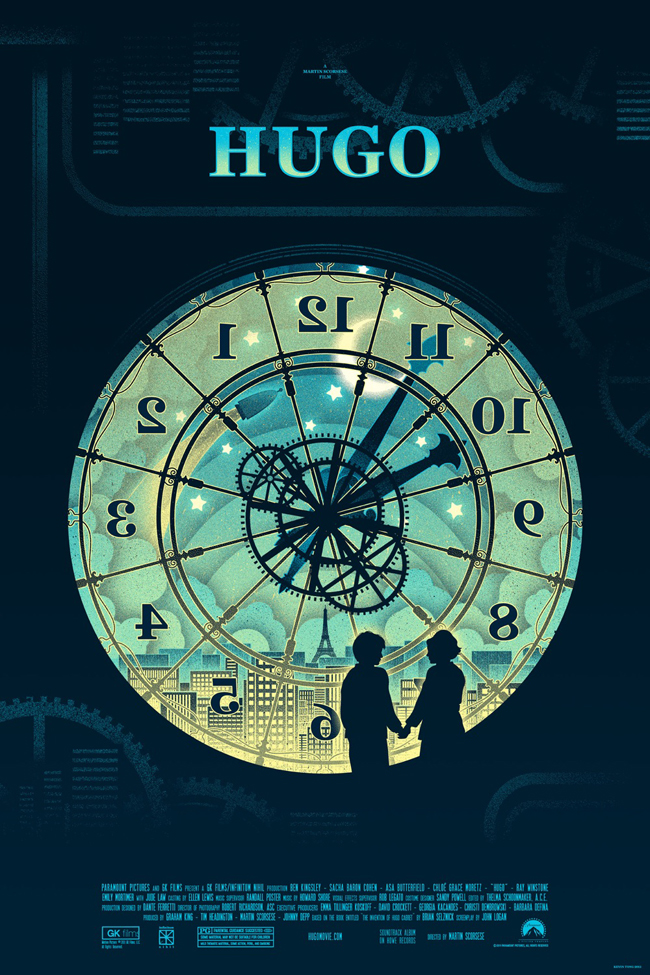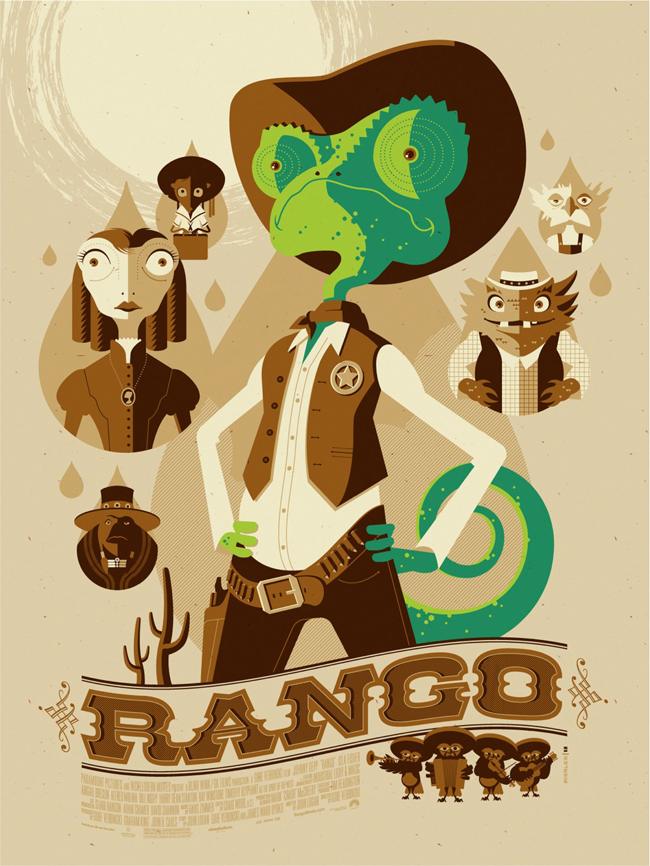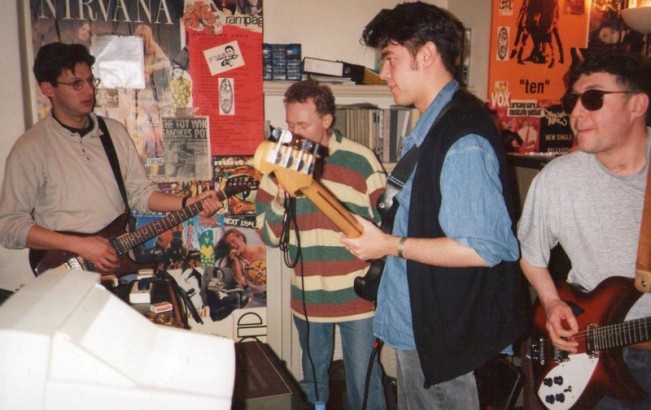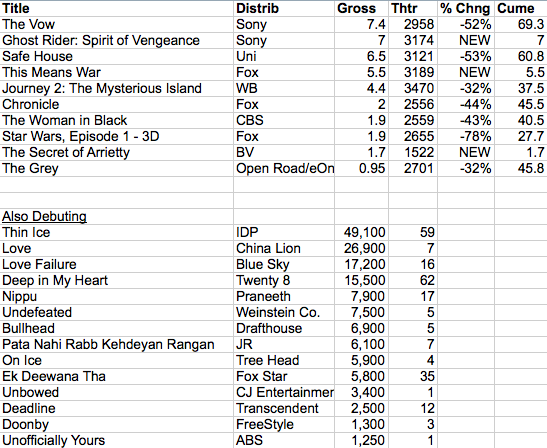The Hot Blog Archive for February, 2012
Friday Estimates by Ghost Klady 2
What can one say? Expectations continue to be the most stupid way of writing about box office… followed closely by “reporting” on which film will be #1, #2, #3, etc. (Don’t get me started on last weekend’s non-record-breaking “record breaking” weekend.)
Two problem movies, one at Sony and one at Fox, rolled out to decent, but “disappointing” numbers. We’ll see how these films play out over the next couple of days, but the problems both studios are having with audiences were apparent weeks ago to anyone paying attention… and were not corrected. It’s sadly simple. It’s almost impossible to fix a bad first impression. It’s even harder if you don’t have the goods with which to work.
Meanwhile, The Vow will become Screen Gems’ biggest domestic grosser by the end of the holiday weekend. Rachel McAdams reasserts her dominance over Amanda Seyfried. And we’re reminded of just how powerful women can be at the box office when inspired.
And Denzel is having a good Denzel movie, still out ahead of The Book of Eli, looking like it may become one his top 5 grossers ever… perhaps his 4th $100m domestic movie.
Chronicle will pass $50m domestic this weekend… off of a budget under $20m. Not quite Paranormal Activity, but quite a success.
The Woman In Black is now CBS films’ biggest grosser. It is a pick up, as is their next release, Salmon Fishing in the Yemen. These are now exercises in pure marketing. And that’s probably the best potential future for this company. A sidebar company like this just isn’t built for being a successful production house. There are some tremendous marketing minds in-house and consulting there. Stick to what you know. There’s no better time to be a company picking up movies funded by others. Step by step.
47 Comments »Mondo Goes To The Oscars
PRESS RELEASE: Mondo, the collectible art boutique of the Alamo Drafthouse, announces its first ever Academy Awards poster series, featuring limited edition prints of their favorite nominated films in select categories. There will be four posters from four different categories and the first two include:

HUGO (Best Picture category)
Artist: Kevin Tong
Size: 24×36
Edition: Regular (295), Variant (100)
Price: Regular ($45), Variant ($70)

RANGO (Best Animated Film category)
Artist: Tom Whalen
Size: 18×24
Edition: 270
Price: $40
The other two posters in the series will be revealed next week.
It was announced last year that Mondo has partnered with the Academy of Motion Picture Arts & Sciences to archive all prints for their research library.
Posters for all four films will be sold during the Academy Awards on Sunday, February 26. Follow @MondoNews for the sale announce time.
5 Comments »DP/30 @ Sundance: BCDF Studios
The trio behind a trio of Sundance success stories this year (Bachelorette, Predisposed, Liberal Arts)… a unique story of a new indie start up that seems to be working quite effectively.
1 Comment »Titanic 3D
So… we went to a Valentine’s Night screening of Titanic 3D, which also seemed to be a chance for Paramount to do a reaction spot for TV.
My reaction is not much different than how I felt when I saw the T3D presentation at the studio months ago. Looks gorgeous in 4K on a big screen. No real need for the 3D.
I was happy that when we got to the theater, it turned out not to be IMAX 3D. Those glasses are ridiculous and I have only had one or two happy experiences with that specific format. (I quite like IMAX and don’t always dislike 3D.) So I didn’t get irritated by having the glasses on as we watched the hours of film roll by.
However… I found myself wanting to take the glasses off repeatedly. And here is why: it’s like watching the movie through a filter. Call it darkness, call it clarity… call it what you like. But for me, especially on Titanic, the slight facial fur and occasional acne under the make-up on Kate Winslet and the small pock marks on Leonardo DiCaprio’s face are a part of the intimacy of the movie. The movie takes such painstaking efforts to get every detail right… I want to see them, including the imperfections. And with those glasses on, I could not. Some might be happy not to see detail… to have the image smoothed out even more. But not me. These people are beautiful. They’re imperfections are beautiful.
It struck me that Titanic, which does include some CG, is really the last epic movie anywhere near this size that we are likely to ever see made on a set like this. I can’t speak for a mad genius like Jim Cameron… maybe if he made the film today, he’s still shoot it in a tank with smaller-than-scale but still humongous sets. But most studios, if they were going to make this film, would be CGing most of it… especially with such advances in quality. (One of my favorite things in the digitized version is that Cameron didn’t upgrade the CG of actors on the deck that were cutting edge back then and now look like Lego characters in some shots.)
There were, maybe, a half dozen shots in the whole movie in which the 3D made any difference of significance to me. And as I say, the glasses cost intimacy.
As for the movie itself… God… so much better from start to finish than I remember. Billy Zane is still the sore thumb (no fault of his), but not nearly as offensive as I remember his character being fifteen years ago. The pre-memory opening sequence is a little long and a little too coy about the real intent of the exploration. But somehow, the movie felt like it was 45 minutes shorter than it actually is as we watched it on Tuesday night. Cameron delivers so many beautiful moments. I mean, masterful, masterful filmmaking. One forgets, with years between films and Avatar being such an overwhelming visual experience, just how special this guy is as a teller of intimate stories.
I felt a universalism in Jack and Rose in this film that I didn’t feel 15 years ago. Maybe it’s the GOP primary battle playing out in the last few months, but the generational conflict of this film felt clearer, more one-sided, and more political than ever. Wealth is greedy and selfish and myopic. Youth is open and ambitious and alive. Molly Brown is the hinge for the wealthy. The middle-aged poor on the boat are the hinge for youth, suffering loss with a bit more perspective than Jack and the other young ones. But, it’s not all black and white. Cameron allows grace notes for the rich and some ugliness amongst the lower class… mostly young men working on the ship.
By the end of the tale, bodies everywhere and just over 700 on lifeboats, most viewers will probably feel that the world would be better off if most of those on the lifeboats – majority wealthy – were floating in the water and vice versa.
And when the Heart of the Ocean hits the water, we’re not just moved by the love still held by Rose for Jack, but it’s kind of a happy “fuck you” to Bill Paxton’s expedition of greed.
I’m sure a lot of this was there for many viewers back 15 years ago. But it all really hit me in this screening. And it felt like this could be a real phenomenon amongst a new generation of teenagers… not just an opportunity for people 30 and over to engage in a kitsch-fest from their not-so-long-ago youths.
I’d go again.
I probably will.
To a 2D screen this April.
35 Comments »DP/30: 2 Oscar Animated Shorts – Sunday and Wild Life
The filmmakers of two of the Animated Shorts nominated for the Academy Award: Amanda Forbis & Wendy Tilby of Wild Life and Patrick Doyon of Sunday
Patrick Goldstein’s Good Oscar Idea
You don’t hear this from me much… but Patrick Goldstein offered up a really smart idea recently.
In 2012, why wouldn’t The Academy do the nominations announcement as a prime-time special?
Yes, there is a certain weird tradition of nominees being woken up to the good news. And it would be easy – some of Patrick’s specific suggestions included – to turn the whole thing into a grotesque cheesefest. “Who wouldn’t want to see “The Help’s” Viola Davis relishing the moment or “Moneyball’s” Jonah Hill getting a congratulatory call from costar Brad Pitt?” Me. I could deal with, say, live feeds – after nomination – of gatherings of folks from various films and a quick interview or two. I don’t want to see George Clooney in his living room in Lake Como trying to win the moment because he’s been put on the spot.
But that’s detail work. What I would love to see is packages for Picture, Animated Feature, Doc, and Foreign Language of 5 minutes each, showing why, essentially, they have been nominated. In a celebration of the movies, why not turn the nominations event into a national ad campaign for all of the films.
I don’t need pundits to tell me who they think was snubbed or what the supposed Academy logic was. I need, “Here’s a clip from In Darkness, which you will never see a TV spot for, but now you are seeing a minute.” Or If A Tree Falls.
I need to see the below the line team from Hugo contextualized by Scorsese or War Horse by Spielberg or The Help with Tate Taylor… “these are the people who come together to create the images you love watching on the big screen.”
Or something like that.
The 5:30a thing is silly. The only problem with a primetime show is that it would, in theory, be on one network. The goal is for it to be on every network at the same time. I get it. I just think we may be past that.
And I agree with Patrick that this would be a chance for something looser… something more fun. We disagree, I think, that the awards themselves should be more fun. I think stodginess is the brand and that if you break with that on Oscar night, you suddenly are really competing with The Globes and the others. And that, I think, would be a mistake.
14 Comments »An Open Letter To DJ Pangburn: Why Whining About The Movie Business Is Stupid
Someone tweeted or linked or something to “An Open Letter to Hollywood: stop blaming piracy and make films worthy of cinematic experience” and as I read this thing it struck me that Mr. Pangburn had created an iconic document that truly represents both good reasoning and sheer willful ignorance about the commercial cinema today.
We’re less than two weeks from Oscar, where a variation of the same argument strikes at the core of the event. Smart people understand that The Academy is just a very narrow slice of the movie loving audience and that both their tastes and their vulnerability to marketing is unique to them and that the choices they end up making as a group simply reflects that reality. On the other hand, there is something so unavoidably iconic about an Oscar that you can get even the most thoughtful cinephilic thinker to practically stroke out over what film will be called “the best of the year.” Even crazier, people know full well that 80 or so mostly unqualified, certainly unvetted people choose the Golden Globes… and people still act as though it matters.
Mr. Pangburn starts with a trip to “a cinema in the East Village,” where he sees Mission: Impossible – Ghost Protocol.
I almost want to stop there. When I was in my 20s, there was no cinema in the East Village in which one could see a Mission: Impossible type of movie. Many of the movie theaters of my youth have changed hands (2 are now part of NYU), but back in the day, the Village was 100% arthouse. I don’t recall a commercial cinema around Union Square back then. I think the southernmost commercial houses were on 23rd st or so.
But I digress…
Pangburn defines his perspective thusly: “Almost everyone I know is a cinema lover. That is, all of my friends, family and many of my acquaintances love the act of going to the cinema, though none are professional critics or filmmakers. These people are a good cross-section of the American population, too, with varying careers, interests, income levels, hobbies, tastes, etc. Only two actively pirate content, but even they are quite willing to drop money on a movie, whether it be at the cinema or a DVD (buy or rent).”
This is where Pangburn, like most people, goes off the rails. How so? Because he sees his personal experience as defining the overall culture to a great degree and he lives in a (desirable) bubble. People who live in Manhattan are NOT a “good cross-section of the American population.” You could have every ethnicity, sex, culture, height, and dress size represented and living in Manhattan guarantees that you are NOT a cross-section of the American population. And the same is true of the west side of Los Angeles.
Looking specifically to the thesis of his open letter, let’s examine the last sentence of that graph. “Only two actively pirate content, but even they are quite willing to drop money on a movie, whether it be at the cinema or a DVD (buy or rent).”
Let’s get the easy part out of the way first. The MPAA overemphasizes piracy a a current issue in the United States. Most of the losses are international. And they are significant. If someone suddenly took 15% of your paycheck every week without the right to do so, you would surely feel the same way. But in the US, the losses are not as great. However… as the digital age continues and control of content rights delivered digitally in dozens of ways becomes the primary revenue engine for the industry, trying to get a handle on the content is perfect reasonable.
The only people who are seriously blaming piracy for the mostly imaginary theatrical box office downturn are idiot journalists who think excuses made for specific poor performances equate to a real trend… when year after year, the numbers tell us otherwise. How stupid to you have to be to screech about a box office downturn of 4% being the end of theatrical while the DVD business for feature films is off over 50% from its height just a few years ago? Show me all the “home entertainment is dead… long live theatrical” stories.
But back to Mr. Pangburn’s confusion… If his “friends, family and many of (his) acquaintances” got to the movies more than 8 times a year, they are part of a small percentage of American who go to movie theaters that often. And while it’s a lovely game to play to claim that this is simply because adults and other audiences are not well served by the cinema that is available to them, it’s bullshit. Those of us who live in The Movie Loving Zones forget that we are a minority in this country, even if we also happen to control the media that blankets the nation. And if you have seen a show on Broadway in the last year, you are part of an even smaller minority… whether the season was the best ever or the worst ever.
No one has ever been able to offer statistical proof of a significant correlation between the quality of movies – or theater or TV – and the box office returns/viewership. Of course, there is a highly subjective element to the endeavor. But even allowing for the broadest reading, sometimes “good” sells, sometimes it doesn’t… sometimes crap is wildly popular, sometimes it is not. Same as it ever was.
To be realistic about Hollywood, you have to start by understanding the market that Hollywood services. And that market – sorry – does not evolve with your personal tastes… or mine, for that matter. That market, whether you like it or not, is likely to make “James Cameron’s absurdist exercise in retroactively turning “Titanic” into a 3D experience” into a $400 million worldwide grosser at the very least… against 3D conversion costs of about $30 million and marketing of about $100 million. That’s a likely minimum $90 million pure profit in theatrical… and that’s before the film’s value spikes in Home Entertainment for a new generation of teens.
That market, when it comes to the high grossers, is driven by teenagers and young 20somethings… because they still have the time, energy, money, and interest in going out to the movies at least once a month.
Your complaining is a little like a busty woman wearing a top that shows off half of her bosom getting upset with her date for staring at her breasts. The top ten movies grossed over $7.8 billion worldwide last year. “Hey, Hollywood… my ideals are up here!”
Men and Hollywood may both be pigs a lot of the time and even if the goods were covered up in a burka, they might keep leering instead of making eye contact. But not all men and not all of Hollywood. Expectations have to be realistic and opportunities for outcomes we feel good about must be optimized.
I have enormous love and respect for indie filmmakers. But for every Napoleon Dynamite, Blair Witch, Little Miss Sunshine, and Juno, there are 2,500 films that are still looking for DVD distribution, much less theatrical. (And my guess is, those mega-indie hits are too mainstream for Mr. Pangburn.) The indie market is a market in which $10 million in all-streams gross is a huge hit. And only Sony continues to embrace a model in which those kinds of films are held in high esteem by a studio. Fox Searchlight has been buying some more challenging product lately… and that’s great. And Paramount wants very inexpensive – mostly crap -films that are highly marketable… not sure that makes anyone but horror fans and the staff of that division very happy. It’s a shame – and not very good business – for the other major studios to not stay in the indie business. But it is what it is. In the world of $100m production budgets and $150m worldwide marketing budgets, it’s a sidebar.
This is the part where some people want to call me an apologist for the majors. But that’s a load of crap. I’m a realist. And these are businesses, not artistic endeavors. Some great artists work inside of the system, but their art is truly coincidental to their ability to make these corporations money and/or to give them a sheen of elevated goals.
This brings me to the third major fallacy in this open letter… that “There are hundreds, maybe thousands of Neil Blomkampfs out there, equipped with stories and cinematic vision, ripe for the picking. There are Edgar Wrights, Steve McQueens (“Hunger”) and Duncan Jones aplenty. Find them and give them a shot.”
Are you out of your fucking mind?
Ahem… sorry… lost my composure.
But… seriously… are you out of your fucking mind?
Are there hundreds or thousands of people with artistic skill out there? Yes. Are hundreds of potentially successfully filmmakers out there working on films you will never hear about already? Yes. Was the number of Sundance submissions this year 5000?
But the difference between Neil Blomkamp, Edgar Wright, Steve McQueen, and Duncan Jones and most of the rest is… they got where they were going. (Blomkamp is the only one who made serious money for anyone… and he’s only one film in, so we’ll see where he goes.) But this notion that being a working filmmaker is about the art first is false.
Even McQueen, who still self-identifies as “an artist” and not fully a “filmmaker” had to do more than create art to get ahead. He has had to – however much he will claim otherwise – create Steve McQueen as a commodity… a commodity that people will invest in and promote to a degree that allows him to focus primarily on creating his work. And ironically, McQueen gets smacked by some for being too much of a commodity. But do you know why Shame was really set in NYC? Because no one in England would put the money up for him to make the movie there.
Duncan Jones made commercials. Edgar Wright made television. Blomkamp got himself in bed with one of the deities of mainstream genre cinema.
This notion that “there are thousands of them” is not only absurd, but it’s terribly insulting to the people who fought to get where they are.
John Sayles teaches and script doctors to pay for his movies now. John. Sayles.
You know who thinks this business is so easy for the “artists” if only they got a break? People who have never been down that road. Yes, there are many thousands of talented people who might be good filmmakers. But it’s a lot more than someone deciding to scoop them up and sprinkle them with cash. I’m sure there have been many artists as talented as Picasso who never got discovered.. many more who gave up before their skills could blossom. But Picasso was really good at being Picasso. The skill of becoming and maintaining is a big part of the successful launch of all but a tiny percentage of filmmakers and other artists out there.
Of course, in Pangburn’s view of Hollywood, selling the big dumb movies is a walk in the park. “if your marketing teams spent half the time given to marketing “Transformers” sequels (which, let’s be honest, really don’t need much marketing)…” It’s just such a childish view… a market that Pangburn – and many others over 22 – doesn’t care about… but that is popular when audiences see what they are interested in… in the marketing. Or did he miss Universal stoking the flames of a surprise hit in Bridesmaids while not being able to get where they needed to with Cowboys & Aliens? Apparently, Mr Pangburn believes that Bridesmaids opened itself to $26 million. Or maybe he sees that as one of the “easy” movies. I don’t know.
My final whack is at one of my favorite humdingers… and again, Pangburn is hardly alone is this silly mythologizing. “Christopher Nolan’s “Inception” was neither 3D nor formulaic (except for perhaps in a post-modern way) and it doubled “Clash of the Titans” (a 3D film) in box office receipts to the tune of $830 million. For you, however, the originality of “Inception” is irrelevant—in your arrogance, you believe it’s the exception not the rule.”
The originality of Inception is certainly not irrelevant. And it is a clear reason why, in great part, it’s a $830m grosser and not a $400m grosser. But let’s not forget… Nolan’s previous film grossed a billion… he spent at least $160 million (lots of it on effects) on Inception, which were heavily emphasized in the marketing campaign and led to a $63m domestic opening.. and it was the FOURTH highest grosser of 2010, behind a 3quel, a 7quel, and a reboot of one of the most filmed stories of all time, Alice in Wonderland, led in marketing by a supporting character who fronted 4 pirate movies to mega-numbers.
And for the sake of accuracy, Inception was more than $160m away from doubling the gross of Clash of the Titans. That doesn’t make the comparison of stupid and smart any less true., But be honest. Twilight: Eclipse made $125m less than Inception… but made a lot more profit.
What is singular about Inception is Christopher Nolan… whether Pangburn wants to believe it or not. There are not a lot of people who could have made a movie that was both original and constructed within a very commercial structure like Nolan did… and does on the Batman films too. I know it’s the fantasy that every artist with vision can make a film that would inspire $800m in business worldwide… but this way madness lies.
Again… I completely get where you are coming from, in terms of so much crap being made by the system. But you have no respect for the money. And the money makes all of it, high and low, possible. It doesn’t take a genius to know that studios overreached on 3D in the last 2 years. But instead of taking a moderate, thoughtful position about a format that now has seen Scorsese, Spielberg, Ridley Scott, and Wim Wenders, amongst others, jump in to interesting effect, you just need to tell Hollywood how dumb it is again.
There are many, many things about this town that I think – often in agreement with the likes of Pangburn – are idiotic. But this “let the artists work and it will all work out” is sophomoric bullshit. Yes, some great work would be made that would not have otherwise been made. And the studios, as they are, would likely be out of business within a few years.
Seven of the Top Eight grossers of this year were at least the 3rd film in their franchises. And the 8th? Kung Fu Panda II… which is only the 2nd film, but there is a daily TV series on cable with all the characters, filling the emptiness. And we can round other the Top 20 for the year with 12 more films, 6 of which are sequels or higher in the franchise count, 4 were based on comics, 1 was a spin-off of another franchise, and 1 was “original” (Rio).
It’s hard to make blanket statements about a business in which The Debt and The Sitter make about the same amount in the US. And where do you put a film like Sucker Punch, which was Zack Snyder’s vision, funded at a big price by a major studio, and apparently reined in a bit in post… but still, the artist’s vision? Where do you put Larry Crowne, which was Tom Hanks’ vision? Where do you put The Rum Diary or Warrior?
Forget this game of “there are a ton of Nolans out there” and look back and make the best list you can of great filmmakers who haven’t made a film in a long while… then look closely at why. There are a lot of different answers. Some make the studios look stupid, some come back right to the inability of Filmmaker X to deal with the business of filmmaking. And of course, even the finest filmmakers will sometimes make a turd. And the worst hacks will sometimes make gold.
The answer is not simple. It is in the doing, not the theorizing. The money and the art do not always match.
Best regards,
David Poland
DP/30: “Real In RIO,” composer Sergio Mendes, lyrcist Siedah Garrett
Obviously not a very heavy movie conversation… but I really loved doing this interview. One doesn’t always get a impromptu concert from Sergio Mendes and Siedah Garrett on a Monday afternoon.
Past Lives Of Oscar Nominees
Supporting Actress nominee Berenice Bejo, 1997
Enceinte Ou Lesbienne ? by Eleha
Best Adapted Screenplay nominee Peter Straughan, guitarist/songwriter for Catcusman, late 90s

Oprah As Metaphor For Netflix
“I’m every post-theatrical content opportunity… it’s all in me….”
As I was reading a NYT piece about Oprah tweeting that people with Nielsen boxes should turn in to the still-not-hot OWN, it occurred to me that Oprah’s current challenge is not unlike the current future challenge of Netflix.
She was the unquestionable leader in daytime television and given the cost of producing her show, was an unrelenting cash cow. But she decided to retire from that place and to take her cache and skills to a new cable net, built in in her name and image, OWN. But it isn’t the Oprah Winfrey Show Network. It is a network of shows that fit her sensibilities and interests. And what we have quickly learned is that it was the host and her relationship to viewers that drew massive and eagerly led crowds, not the sensibility of said host.
Netflix, like Oprah, created a brand and personality that has been very successful and sticky. They reinvented the Home Entertainment business by building it as a subscription offering, the basic notion being that if you wanted to see any film, all you has to do was to put it in your queue, and eventually it would land in your mailbox, shiny and DVD-like, and all for less than the cost of 4 monthly rentals at Blockbuster. What’s more… you could return yuor disc(s) and get (a) replacement(s) as often as you liked with no limitations. It was never a perfect system, but it was better than anything else that existed… unless for some reason you needed a specific film immediately.
But there was a serious roadblock to growing the company… the mail… and the increasing cost of postage. The very thing that started the revolution – cheap DVDs – was now in the way of expansion. Postal service is less consistent in other countries. And a smaller country couldn’t support the library costs that, say, the United States can. Plus, there are a ton of detailed impediments, like French and English preferences in Canada, effectively splitting the business in that country.
How can you overcome this problem? Streaming. No big inventories. Delivery of the content can be modified for any household anywhere in the world. No mail to deal with or pay for. And the increasingly ubiquitous nature of wi-fi, HD televisions, and the equipment to stream made this possible.
But like Oprah going from her personal show to a network of programming that mostly does not feature the network’s namesake, there is a paradigm shift for the business itself that is not easy to overcome. It’s almost the opposite of the Oprah situation… they have gone from being everything to everyone to being a programmed, narrower service, which is getting narrower monthly.
That doesn’t mean that I don’t think that Netflix cannot be a successful business on an ongoing basis… nor OWN. But what is clear to me is that expectations have to be changed… because both are operating in a quite different universe at this point. Netflix may well continue to expand internationally, making the company larger overall. But in the US, Netflix will become a smaller business for two reasons. First, as they continue to narrow content, they will lose customers who have some of the specific interests that are being jettisoned. Second, competition, including cost competition for streaming content, will continue to get harder, not easier. One way or the other, Netflix is likely to find its next realistic floor and ceiling in a couple of years, as standard business practices for streaming take hold.
Ironically, if Netflix launched today with its current content options, it would have a very hard time breaking through, even though it is easily the most complete streaming business in existence right now. I believe consumers are waiting for the rest of the shoes to drop before diving in head first. Of course, Netflix is out ahead of the pack and has at least 10 million subscribers who will not fall off of their roles simply because of inertia and comfort with the service. So it will be #1 for a long while… at least a couple of years. But Reed Hastings isn’t looking at 2013. He’s looking at 2015 and later. And the emphasis on “we’re like the new HBO” is about a narrower scale and the idea that people will still pay $9 a month or more for that HBO swath of content. Netflix too wants to be able to get away with saying, “We have more than enough content for this price.” And they do. For now.
But Netflix isn’t Oprah anymore. Unlike Oprah, they didn’t really have the option of staying in place and continuing to be king. So that part of the metaphor doesn’t work. But the rest…
11 Comments »DP/30: 53 Oscar Nominees

PICTURE
Hugo – Graham King
Midnight in Paris – Letty Aronson
The Tree of Life – Bill Pohlad, Dede Gardner
ACTOR
A Better Life – Demian Bichir
The Artist – Jean Dujardin – COMING
Tinker Tailor Solider Spy – Gary Oldman, Nov 2011, Feb 2012
ACTRESS
Albert Nobbs – Glenn Close
My Week With Marilyn – Michelle Williams
SUPPORTING ACTRESS
The Artist – Berenice Bejo – COMING
The Help – Jessica Chastain – May 2011, Aug 2011
Albert Nobbs – Janet McTeer
SUPPORTING ACTOR
My Week With Marilyn – Kenneth Branagh
Warrior – NIck Nolte
Extremely Loud & Incredibly Close –Max von Sydow
DIRECTOR
The Artist – Michel Hazanavicius
ORIGINAL SCREENPLAY
The Artist Michel Hazanavicius
Margin Call – JC Chandor
A Separation – Asghar Farhadi
ADAPTED SCREEENPLAY
Hugo – John Logan
The Ides of March Grant Heslov / Beau Willimon
Tinker Tailor Soldier Spy – Peter Straughan – Oct 2011, Nov 2011
FOREIGN LANGUAGE
A Separation – Asghar Farhadi
Footnote – Joseph Cedar
In Darkness – Agnieszka Holland
ANIMATED FEATURE
A Cat In Paris – Jean-Loup Felicioli and Alain Gagnol
Chico and Rita – Fernando Trueba
Kung Fu Panda 2 – Jessica Yuh Nelson
Puss In Boots – Chris Miller
Rango – Gore Verbinski
DOCUMENTARY
If A Tree Falls: A Story of the Earth Liberation Front – Marshall Curry
Paradise Lost 3: Purgatory – Joe Berlinger
Pina – Wim Wenders, Sept 2011, Dec 2011
To Hell & Back – Danfung Dennis
Undefeated –TJ Martin & Daniel Lindsay
EDITOR
The Artist Michel Hazanavicius
The Descendants – Kevin Tent
Hugo – Thelma Schoonmaker
Moneyball – Christopher Tellefsen
CINEMATOGRAPHY
War Horse – Janusz Kaminski
ART DIRECTION
War Horse – Rick Carter
VISUAL EFFECTS
Rise of the Planet of the Apes – Joe Letteri
SOUND MIXING
Moneyball – Deb Adair
SCORE
The Artist – Ludovic Bource
SONG
The Muppets – Bret McKenzie, Dec 2011, Feb 2012
RIO – Sergio Mendes, Siedah Garrett
ANIMATED SHORT
Dimanche/Sunday – Patrick Doyon
LA Luna – Enrico Casarosa
Wild Life – Amanda Forbis and Wendy Tilby
LIVE ACTION SHORT
Raju – Max Zähle
The Shore – Terry George
ALSO… MEET 9 MORE NOMINEES VIA INTERVIEWS FROM PREVIOUS FILMS
Christopher Plummer
Viola Davis
Jeff Cronenweth
Sandy Powell
Lucy Walker
Kirk Baxter and Angus Wall
Greg P. Russell
Aaron Sorkin
DP/30: A Cat In Paris, writer/directors Jean-Loup Felicioli and Alain Gagnol
DP/30: The Shore, writer/director Terry George
Oscar nominee for Live Action Short
2 Comments »












